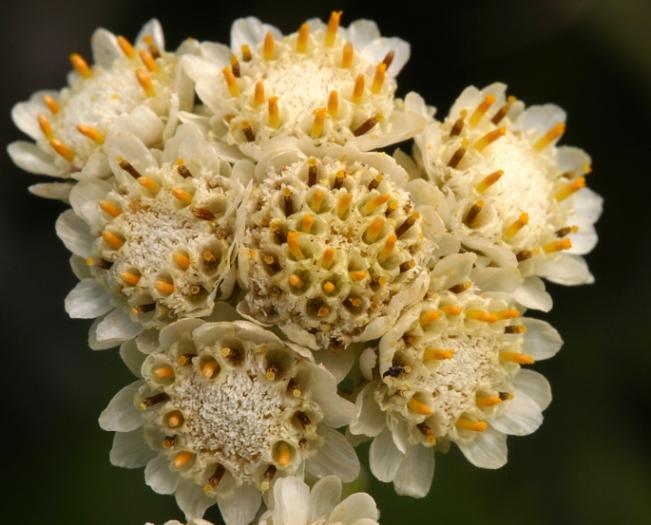Flat-Top Pussytoes
(Antennaria corymbosa)
Flat-Top Pussytoes (Antennaria corymbosa)
/
/

Steve Matson
CC BY 4.0
Image By:
Steve Matson
Recorded By:
Copyright:
CC BY 4.0
Copyright Notice:
Photo by: Steve Matson | License Type: CC BY 4.0 | License URL: http://creativecommons.org/licenses/by/4.0/ | Rights Holder: Steve Matson | Publisher: iNaturalist | Date Created: 2005-07-02T10:38:11-07:00 |
























Estimated Native Range
Summary
Antennaria corymbosa, commonly known as flat-top pussytoes or meadow pussytoes, is a perennial herb that is native to a variety of habitats including alpine and subalpine areas, dry meadows, open forests, and rocky slopes in western North America. It is particularly prevalent in the Rocky Mountains, Cascades, and Sierra Nevada. This plant typically forms low-growing mats reaching up to 6 inches in height and is well-adapted to survive in harsh, cool environments. The foliage consists of basal rosettes of narrow, spatulate, gray-green leaves that are woolly on both sides, which helps to insulate the plant and conserve moisture.
Flat-top pussytoes are valued for their low maintenance and ability to thrive in poor soils, making them suitable for rock gardens, xeriscaping, and as ground cover in sunny areas. They are also used in native plant gardens and for erosion control. The plant is drought-tolerant once established and prefers well-drained soils with full sun to partial shade. It is relatively free from serious pests and diseases. The flowers, which bloom from late spring to early summer, are not particularly showy but are interesting upon close inspection. They are arranged in corymb-like clusters, with male and female flowers on separate plants. The female flowers are white to pale pink and yield achenes with a soft pappus, which aids in wind dispersal.CC BY-SA 4.0
Flat-top pussytoes are valued for their low maintenance and ability to thrive in poor soils, making them suitable for rock gardens, xeriscaping, and as ground cover in sunny areas. They are also used in native plant gardens and for erosion control. The plant is drought-tolerant once established and prefers well-drained soils with full sun to partial shade. It is relatively free from serious pests and diseases. The flowers, which bloom from late spring to early summer, are not particularly showy but are interesting upon close inspection. They are arranged in corymb-like clusters, with male and female flowers on separate plants. The female flowers are white to pale pink and yield achenes with a soft pappus, which aids in wind dispersal.CC BY-SA 4.0
Plant Description
- Plant Type: Herb
- Height: 0.5-1 feet
- Width: 0.5-1 feet
- Growth Rate: Slow
- Flower Color: White, Pink, Brown
- Flowering Season: Spring, Summer
- Leaf Retention: Deciduous
Growth Requirements
- Sun: Part Shade, Full Shade
- Water: Low, Medium
- Drainage: Medium
Common Uses
Deer Resistant, Drought Tolerant, Erosion Control, Groundcover, Low Maintenance, Rock Garden
Natural Habitat
Native to alpine and subalpine areas, dry meadows, open forests, and rocky slopes in western North America
Other Names
Common Names: Meadow Pussytoes, Flat-top Pussytoes, Meadow Everlasting, Corymbose Everlasting, Mountain Everlasting, Corymbose Pussytoes
Scientific Names: , Antennaria corymbosa, Antennaria acuta, Antennaria dioica var. corymbosa, Antennaria hygrophila, Antennaria nardina,
GBIF Accepted Name: